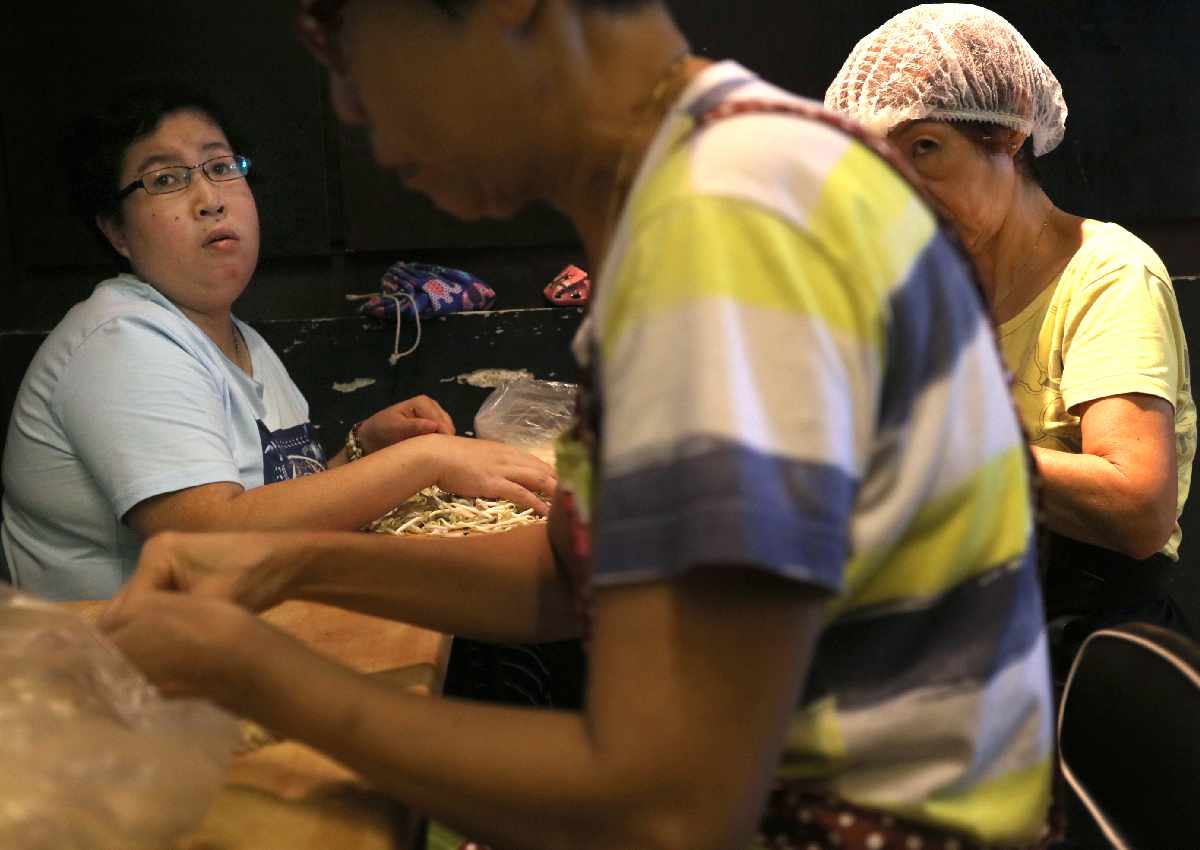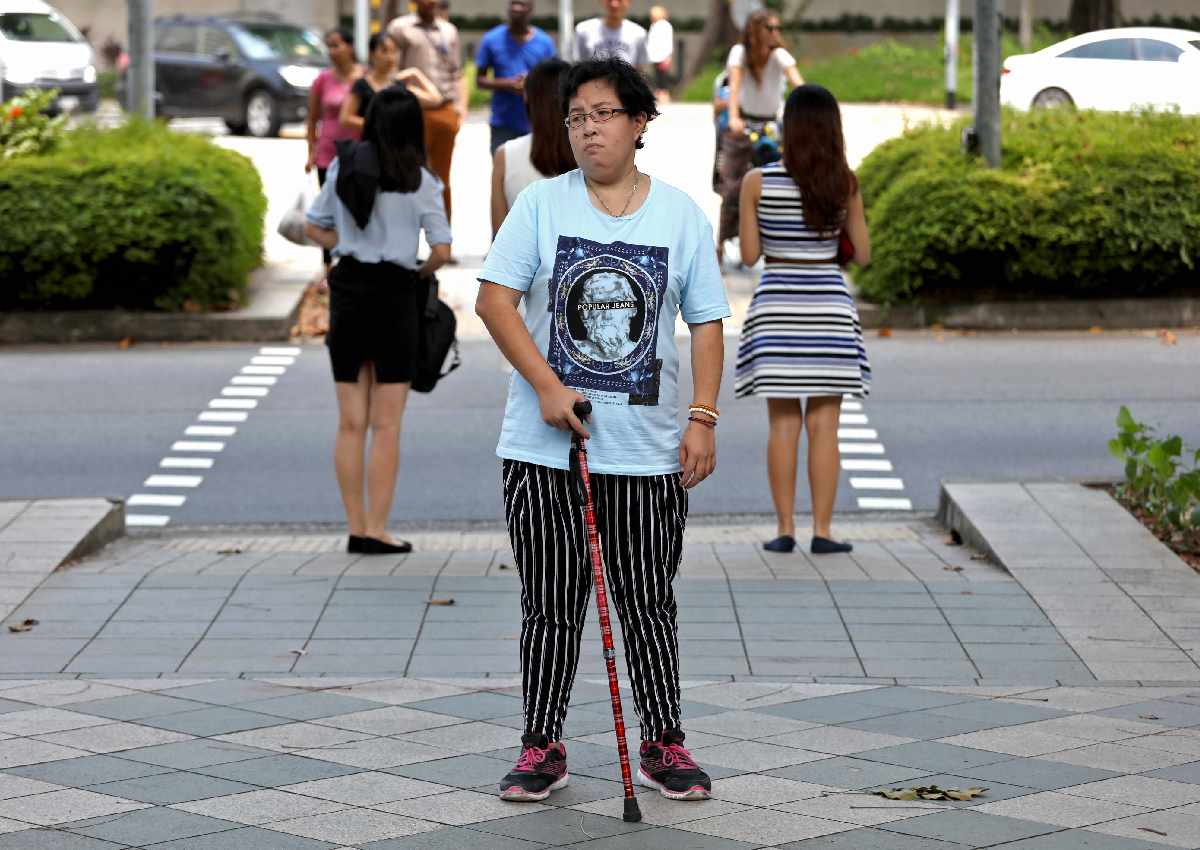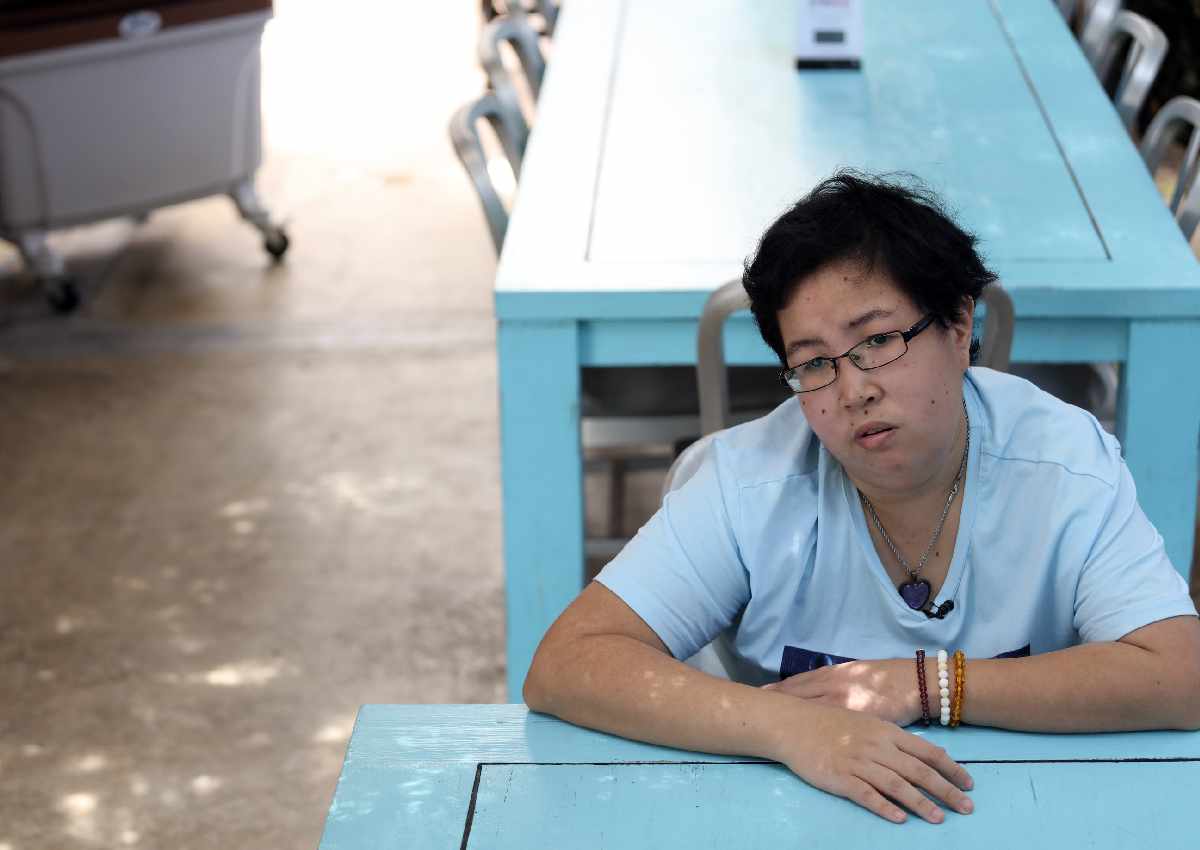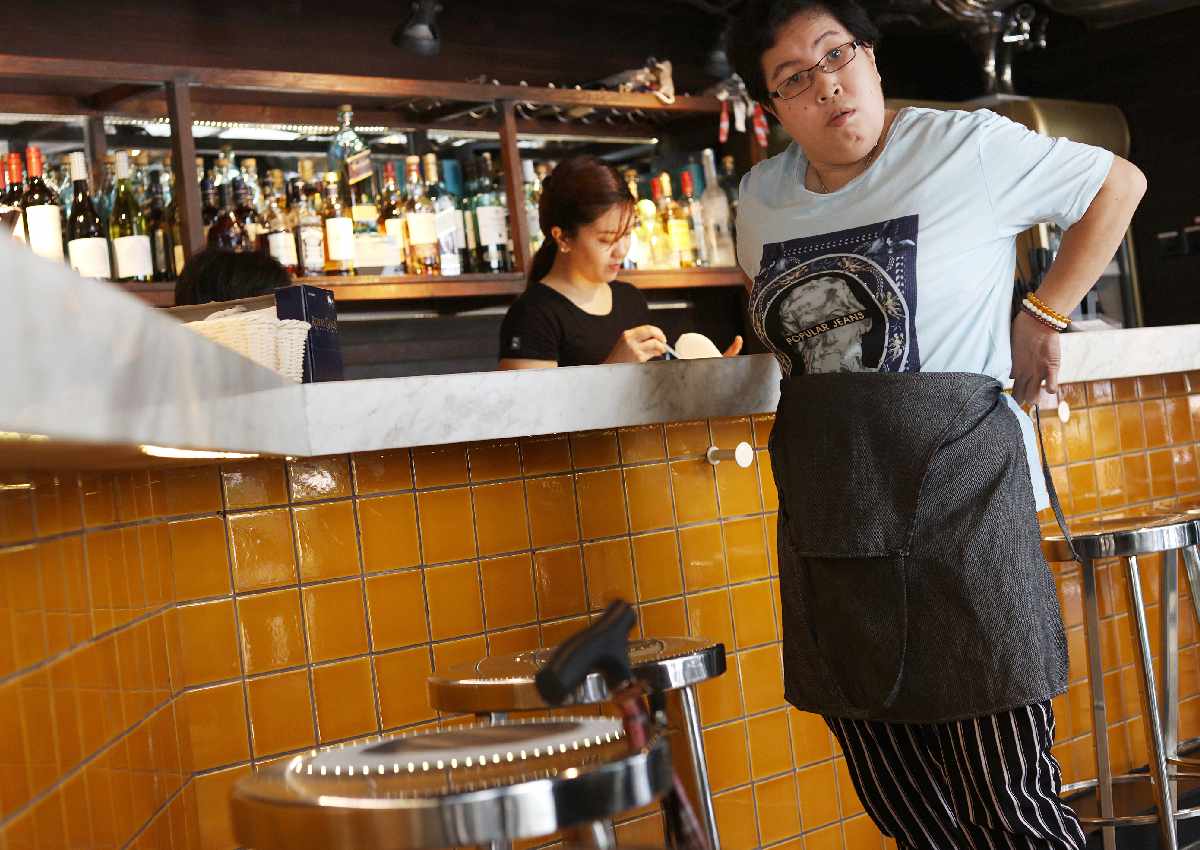A few months ago, Ms Kwan Yuling got her pocket picked while checking out some stalls on her way to a neighbourhood coffee shop in Serangoon North.
She was probably an easy target, the 34-year-old says with a sigh.
An operation to remove a brain tumour three years ago has affected her mobility, and she has to move around with a walking stick.
“Whoever did it probably took advantage of my condition. I didn’t realise it. But I lost my IC, ATM card and $170 in cash meant to settle my utilities bill,” she says in Mandarin.
It is a small fortune to Ms Kwan who earns just over $300 a month, working part-time in a social enterprise.
“My heart ached but I don’t hate the pickpocket. Everyone makes mistakes.
“Anyway, I can always earn the money back,” she says simply.
The absence of rancour is admirable for someone who has been dealt so many bad cards in life that griping should be her birthright.
Fair, bespectacled with hair cropped neat and short, Ms Kwan is sitting at the void deck of an HDB block in Serangoon North Avenue 1. Home, which she shares with her mother in a nearby block, she says shyly, is too messy to receive visitors.

She grew up in a one-room flat in Bukit Merah, the younger of two children of a contractor and a factory worker.
“I was five years old when I was diagnosed with leukaemia,” she says, referring to the cancer which usually starts in the bone marrow.
Although her memories of this period are hazy, she remembers frequent trips to the hospital where she was subjected to a whole host of treatments, from bone marrow extractions to radiation therapy.
Home was not exactly a happy haven for the former student of Serangoon Garden South Primary.
Her brother – older by a decade – was a ruffian and no stranger to boys’ homes.
Quarrels often erupted between her mother and her father, who did not believe in sparing the rod when she did not do well in her exams.
“He owed a lot of money to loan sharks and also had another family,” she says.
Things came to a head when Ms Kwan’s health woes landed her in hospital when she was 14.
“My mother was visiting me one day when the hospital served me my meal. She ate it instead, but choked on a piece of fish,” she says.
This apparently led to a stroke, and her mother spent a couple of years rehabilitating in hospital.
During this time, her father and brother left the home. “I’ve never seen them since,” she says.
No relatives stepped forward to help. “They looked down on us,” says Ms Kwan, who spent two years at the Institute of Technical Education in Geylang Serai studying English and basic electrical skills after completing her primary school education.
Social workers placed her in a girls’ home in Marymount, where she spent two years helping out in the kitchen.
“I didn’t have any friends. The other girls didn’t like to talk to me,” she says, adding that she went home to live with her mother after the latter was discharged from a rehabilitation hospital in Ang Mo Kio.
To get by, mother and daughter found work at McDonald’s in United Square, working alongside each other six hours a day for $3.50 an hour.
Her next gig, secured with the help of the girls’ home, paid more: $1,200 a month as a sales assistant at Metro department store, first at Marina Square and later at Paragon.
Friends were not easy to come by.

“I just did my own thing. I didn’t have time for friends,” she says quietly, trying to sound cavalier to mask her hurt. “After work, I’d just go home for dinner and watch TV.”
Jobs were not easy to keep either, probably because she has only primary school education and was self-conscious and shy.
However, she felt no bitterness.
“I wasn’t sad. If I lost a job, I just told myself I had to jia you (try harder in Mandarin).
“I’d look through the newspapers or approach sales promoters in shopping centres to find out if they needed sales assistants,” she says.
Over the next decade, she worked at a number of sales jobs, pushing everything from strollers to babies’ clothes to shoes.
Things took a bleak turn in 2013 when she was working as a shoe promoter in Hougang Mall.
She was on a ladder, getting a pair of shoes from a high shelf when she lost her balance and fell 2m, hitting the side of her head.
Unknown to her, two tumours had grown in her brain causing a build-up of fluids – probably a late effect of the radiation she had when she was a child.
This in turn affected her vision and caused frequent migraines, as well as mobility issues on the left side of her body. “My left arm and leg didn’t have any strength but I didn’t see the doctor,” she says.
Her fall saw her admitted to Tan Tock Seng Hospital (TTSH), where doctors inserted a tube from her brain to her stomach to drain the fluid build-up in her head.
The next month, she went through a seven-hour operation during which doctors took out the bigger of her two tumours, roughly the size of a golf ball.
She could not eat, drink, walk or talk for a couple of months after the procedure and had to be fed through an intravenous tube.
Ms Eileen Ho, a senior medical social worker with TTSH, says Ms Kwan was more concerned about her mother’s well-being than her own condition during this period.
“Because she was not able to work, she constantly requested social assistance to support her mother. She was afraid her mother would not be able to cope,” says Ms Ho.
Ms Kwan’s concern for her mother also propelled her to work hard at her rehabilitation, which took several months. “I told myself I had to recover. I wanted to be normal like everyone else,” she says.
Her fighting spirit impressed Ms Zhou Lifeng, a nurse clinician at the National Neuroscience Institute.
“Initially, she was a bit depressed but she was very obedient because she really wanted to recover. She is very strong. She thinks positively, doesn’t worry excessively and has a natural instinct to want to do well,” says Ms Zhou.
Gradually Ms Kwan regained her ability to eat, talk and walk.
However, she now speaks with a slight slur and has to move around with the aid of a walking stick.

When she was able to, Ms Kwan signed up for vocational training so that she could get a job and start earning her own keep again.
It took a while but with the help of SG Enable – an agency which helps people with disabilities – she landed a job as a kitchen assistant with social enterprise New Rasa Singapura last November.
Ms Josephine Ng, director of New Rasa Singapura, says that Ms Kwan was initially fearful and apprehensive about working again because of what she had gone through.
“But she was able to conquer her fear and she tries her best,” says Ms Ng. “She’s like a kid in many ways, always trying to gain approval and make friends.
“She likes giving the people here little presents and cards. They like having her around.”
Her positivity and determination so moved Ms Ho and Ms Zhou that both of them nominated her for this year’s Singapore Health Inspirational Patient Award.
Says Ms Ho: “We hope that her courage and positive attitude will help to encourage many.
“She has certainly encouraged us as health workers. She made us feel that our efforts to help and support her are worthwhile.”
Adds Ms Zhou: “You know, it’s been three years since her operation and rehabilitation.
“But, without fail, she sends us a ‘thank you’ card each year. She has so much gratitude and appreciation for people who have helped her.”
Ms Kwan says she draws a lot of comfort from a book about Nick Vujicic – a well-known author and motivational speaker born without limbs – given to her by a manager at SG Enable.
“Like him, I must try and try and I mustn’t give up. And when I fail, I must get up and try again,” she says.
Envy and self-pity are not guests she entertains.
She says: “I don’t feel jealous about other people. Everyone has challenges and problems.
“I do feel a bit sad about my health problems sometimes, but they’re beyond my control.”
She has no time for flights of fancy either. Asked if she dreams of getting married, she crinkles her nose.
“No one wants someone with a tongkat,” she says, using the Malay word for walking stick.
“No one will marry me lah, so I don’t even think about it. Anyway, I can take care of myself.”
She would rather dream of visiting Universal Studios Singapore in Sentosa. “I hear there are many cartoon characters there. I’ve seen the place on TV, but I’ve never been there,” she says. Her favourite TV programme, she lets on, is BENGpire, which recommends things to do and places to eat after dark.
Asked how she gets on with her mother, she quips: “She just sits at home and looks like a pretty vase.”
But, she adds quietly: “She’s already 66, so I pray for her health.”
What rattles her sometimes is the prospect of growing old friendless and penniless.
“I’ll try to work harder and make more friends,” says Ms Kwan, who has three confidantes with whom she shares her joys and woes.
“I just have to live life and take things one step at a time.”

This article was first published on Aug 21, 2016.
Get a copy of The Straits Times or go to straitstimes.com for more stories.






